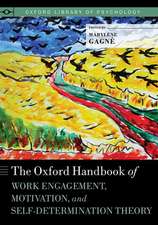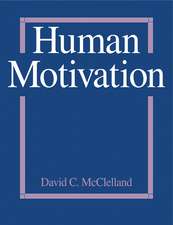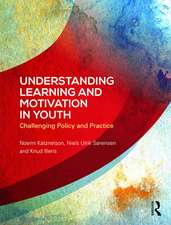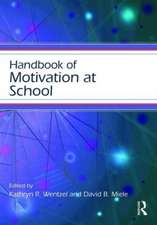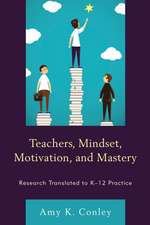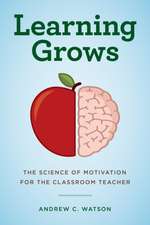The Cambridge Handbook of Motivation and Learning: Cambridge Handbooks in Psychology
Autor K. Ann Renninger, Suzanne E. Hidien Limba Engleză Paperback – 13 feb 2019
| Toate formatele și edițiile | Preț | Express |
|---|---|---|
| Paperback (1) | 429.69 lei 22-36 zile | +62.57 lei 6-12 zile |
| Cambridge University Press – 13 feb 2019 | 429.69 lei 22-36 zile | +62.57 lei 6-12 zile |
| Hardback (1) | 1254.71 lei 43-57 zile | |
| Cambridge University Press – 13 feb 2019 | 1254.71 lei 43-57 zile |
Din seria Cambridge Handbooks in Psychology
- 23%
 Preț: 1254.71 lei
Preț: 1254.71 lei - 11%
 Preț: 449.49 lei
Preț: 449.49 lei -
 Preț: 502.52 lei
Preț: 502.52 lei - 23%
 Preț: 1248.79 lei
Preț: 1248.79 lei - 8%
 Preț: 426.60 lei
Preț: 426.60 lei -
 Preț: 486.56 lei
Preț: 486.56 lei - 5%
 Preț: 441.42 lei
Preț: 441.42 lei - 9%
 Preț: 1282.44 lei
Preț: 1282.44 lei -
 Preț: 494.25 lei
Preț: 494.25 lei - 9%
 Preț: 594.29 lei
Preț: 594.29 lei - 23%
 Preț: 1246.12 lei
Preț: 1246.12 lei - 5%
 Preț: 397.85 lei
Preț: 397.85 lei - 8%
 Preț: 424.41 lei
Preț: 424.41 lei -
 Preț: 501.96 lei
Preț: 501.96 lei - 19%
 Preț: 494.19 lei
Preț: 494.19 lei - 5%
 Preț: 718.49 lei
Preț: 718.49 lei -
 Preț: 511.59 lei
Preț: 511.59 lei - 8%
 Preț: 426.60 lei
Preț: 426.60 lei - 8%
 Preț: 427.05 lei
Preț: 427.05 lei - 8%
 Preț: 425.42 lei
Preț: 425.42 lei -
 Preț: 411.92 lei
Preț: 411.92 lei -
 Preț: 272.35 lei
Preț: 272.35 lei - 8%
 Preț: 425.42 lei
Preț: 425.42 lei -
 Preț: 511.21 lei
Preț: 511.21 lei -
 Preț: 370.88 lei
Preț: 370.88 lei -
 Preț: 374.90 lei
Preț: 374.90 lei - 8%
 Preț: 489.89 lei
Preț: 489.89 lei - 8%
 Preț: 427.49 lei
Preț: 427.49 lei -
 Preț: 511.59 lei
Preț: 511.59 lei - 5%
 Preț: 1538.86 lei
Preț: 1538.86 lei - 23%
 Preț: 2195.06 lei
Preț: 2195.06 lei - 8%
 Preț: 428.36 lei
Preț: 428.36 lei -
 Preț: 488.47 lei
Preț: 488.47 lei - 8%
 Preț: 420.13 lei
Preț: 420.13 lei - 9%
 Preț: 850.12 lei
Preț: 850.12 lei - 8%
 Preț: 430.05 lei
Preț: 430.05 lei -
 Preț: 497.35 lei
Preț: 497.35 lei -
 Preț: 283.03 lei
Preț: 283.03 lei
Preț: 429.69 lei
Preț vechi: 467.05 lei
-8% Nou
Puncte Express: 645
Preț estimativ în valută:
82.25€ • 89.37$ • 69.13£
82.25€ • 89.37$ • 69.13£
Carte disponibilă
Livrare economică 31 martie-14 aprilie
Livrare express 15-21 martie pentru 72.56 lei
Preluare comenzi: 021 569.72.76
Specificații
ISBN-13: 9781316630792
ISBN-10: 131663079X
Pagini: 822
Ilustrații: 34 b/w illus.
Dimensiuni: 174 x 246 x 37 mm
Greutate: 1.63 kg
Editura: Cambridge University Press
Colecția Cambridge University Press
Seria Cambridge Handbooks in Psychology
Locul publicării:Cambridge, United Kingdom
ISBN-10: 131663079X
Pagini: 822
Ilustrații: 34 b/w illus.
Dimensiuni: 174 x 246 x 37 mm
Greutate: 1.63 kg
Editura: Cambridge University Press
Colecția Cambridge University Press
Seria Cambridge Handbooks in Psychology
Locul publicării:Cambridge, United Kingdom
Cuprins
Foreword W. Schultz; Introduction: motivation and learning S. E. Hidi and K. A. Renninger; Part I. The Self and Its Impact: 1. Self-related information processing and its potential for educational benefit Suzanne E. Hidi, K. Ann Renninger and G. Northoff; 2. Academic self-concept: its centrality in understanding motivation and learning H. W. Marsh, M. Seaton, T. Dicke, P. D. Parker and M. S. Horwood; 3. Self-efficacy in learning: past, present, and future H. S. Ahn and M. Bong; 4. Self-regulation of motivation: a renewable resource for learning C. Sansone, D. M. Geerling, D. B. Thoman and J. L. Smith; 5. Youth development programs: supporting self-motivation in project-based learning R. W. Larson, G. McGovern and C. Orson; Part II. Rewards, Incentives, and Choice: 6. Neuroscientific and psychological approaches to incentives: commonality and multifaceted views K. Murayama; 7. Incentive motivation: the missing piece between learning and behavior P. Anselme and M. J. F. Robinson; 8. Attention, information-seeking, and active sampling: empirical evidence and applications for learning A. Dey and J. Gottlieb; 9. Open digital badges and reward structures D. T. Hickey and K. Schenke; 10. The promise and peril of choosing for motivation and learning E. A. Patall and S. Y. Hooper; Part III. Interest and Internal Motivation: 11. Interest development and learning K. Ann Renninger and Suzanne E. Hidi; 12. Online affinity networks as contexts for connected learning M. Ito, C. Martin, M. Rafalow, K. S. Tekinbas, A. Wortman and R. C. Pfister; 13. Multiple points of access for supporting interest in science J. A. Alexander and K. E. Johnson; 14. Predicting academic effort: the conscientiousness x interest compensation (CONIC) model U. Trautwein and B. Roberts; 15. Reconceptualizing intrinsic motivation: excellence as goal B. Schwartz and A. Wrzesniewski; Part IV. Curiosity and Boredom: 16. Curiosity and learning: a neuroscientific perspective M. J. Gruber, A. Valji and C. Ranganath; 17. Curiosity: nature, dimensionality, and determinants J. Litman; 18. The role of curiosity in learning and motivation D. Shin, H. J. Lee, G. Lee and S. Kim; 19. Boredom T. Goetz, M. Krannich and N. C. Hall; 20. The costs and benefit of boredom in the classroom J. Mugon, J. Danckert, and J. Eastwood; Part V. Goals and Values: 21. Motivated memory: integrating cognitive and affective neuroscience K. Chiew and R. Alison Adcock; 22. Conceptualizing goals S. B. Nolen; 23. Achievement goal orientations: a person-oriented approach M. Niemivirta, A. T. Pulkka, A. Tapola and H. Tuominen; 24. Expectancy-value theory and its relevance for student motivation and learning E. Q. Rosenzweig and A. Wigfield; 25. Utility value and intervention framing E. Canning and J. M. Harackiewicz; Part VI. Methods, Measures, and Perspective: 26. Motivation and learning: measures and methods M. D. Ainley and J. Ainley; 27. Addressing the challenge of measuring student engagement J. A. Fredricks, T. Hofkens and M. T. Wang; 28. Measuring motivation in educational settings: a case for pragmatic measurement J. Kosovich, C. S. Hulleman and K. E. Barron; 29. An integrative perspective for studying motivation in relation to engagement and learning L. Linnenbrink-Garcia and S. V. Wormington; 30. Affordances and attention: learning and culture D. F. Shell and T. Flowerday.
Recenzii
'This Handbook marks significant advances in our thinking about the connections between motivation and learning. It has much to commend it to readers as it generates synergies among areas that for the most part have operated independently.' Jennifer Archer, Program Convenor MTeach(Primary), MTeach(Secondary); Director Teaching Quality (SoE), University of Newcastle, Australia
'The Cambridge Handbook of Motivation and Learning is an impressive contribution that brings together many of the most important scientists in the field. The volume not only presents cutting-edge research but offers exciting perspectives on how to integrate theories and methodologies across disciplines, which is vital to overcoming the current fragmentation of research in this field.' Reinhard Pekrun, Chair of Personality and Educational Psychology, University of Munich, Germany
'This book has incredible range, bringing together top scholarship in the motivation sciences from neuroscience to classroom teaching and learning, from immediate decisions to lifespan development, and from enduring challenges to new opportunities in technology.' Christian Schunn, University of Pittsburgh
'Just how motivation interacts with learning and student performance is laid out from all perspectives in this authoritative Handbook. The authors have assembled superb experts from across the fields of neuroscience, psychology and education to address this important topic. This Cambridge Handbook is the ideal source on motivation and learning.' Kent Berridge, University of Michigan
'The Cambridge Handbook of Motivation and Learning is an impressive contribution that brings together many of the most important scientists in the field. The volume not only presents cutting-edge research but offers exciting perspectives on how to integrate theories and methodologies across disciplines, which is vital to overcoming the current fragmentation of research in this field.' Reinhard Pekrun, Chair of Personality and Educational Psychology, University of Munich, Germany
'This book has incredible range, bringing together top scholarship in the motivation sciences from neuroscience to classroom teaching and learning, from immediate decisions to lifespan development, and from enduring challenges to new opportunities in technology.' Christian Schunn, University of Pittsburgh
'Just how motivation interacts with learning and student performance is laid out from all perspectives in this authoritative Handbook. The authors have assembled superb experts from across the fields of neuroscience, psychology and education to address this important topic. This Cambridge Handbook is the ideal source on motivation and learning.' Kent Berridge, University of Michigan
Notă biografică
Descriere
Leading researchers in psychology and neuroscience have contributed chapters that provide an ideal resource on motivation and learning.

